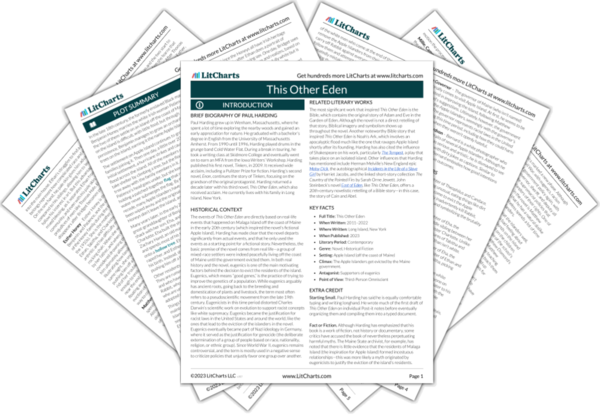Benjamin Honey Quotes in This Other Eden
Benjamin Honey—American, Bantu, Igbo—born enslaved—freed or fled at fifteen, only he ever knew—ship’s carpenter, aspiring orchardist, arrived on the island with his wife, Patience, née Raferty, Galway girl, in 1793.
[…] I held that foolish flag as high as I could, and the water rose up my shoulder, and the water rose up to my raised elbow, and the water rose up my forearm, and the water reached my wrist, and so there was just my one hand holding that motley little tattered flag sticking up above the surface of the flood, and the waters rose up my fingers, and just as my hand was about to disappear and that flag and all us Honeys be swallowed up in the catastrophe, the water stopped rising.
Zachary worked by the light of a candle. As the carvings rose higher up the tree, he made them narrower and more convoluted in order to draw out the composition of each figure and scene so he would not run out of space before he ran out of mortal time, so that he would not complete a work at which he felt more and more he should finish his days laboring, dying as he etched the most elegant possible toes for a barefoot mother weeping for her child.

Benjamin Honey Quotes in This Other Eden
Benjamin Honey—American, Bantu, Igbo—born enslaved—freed or fled at fifteen, only he ever knew—ship’s carpenter, aspiring orchardist, arrived on the island with his wife, Patience, née Raferty, Galway girl, in 1793.
[…] I held that foolish flag as high as I could, and the water rose up my shoulder, and the water rose up to my raised elbow, and the water rose up my forearm, and the water reached my wrist, and so there was just my one hand holding that motley little tattered flag sticking up above the surface of the flood, and the waters rose up my fingers, and just as my hand was about to disappear and that flag and all us Honeys be swallowed up in the catastrophe, the water stopped rising.
Zachary worked by the light of a candle. As the carvings rose higher up the tree, he made them narrower and more convoluted in order to draw out the composition of each figure and scene so he would not run out of space before he ran out of mortal time, so that he would not complete a work at which he felt more and more he should finish his days laboring, dying as he etched the most elegant possible toes for a barefoot mother weeping for her child.











